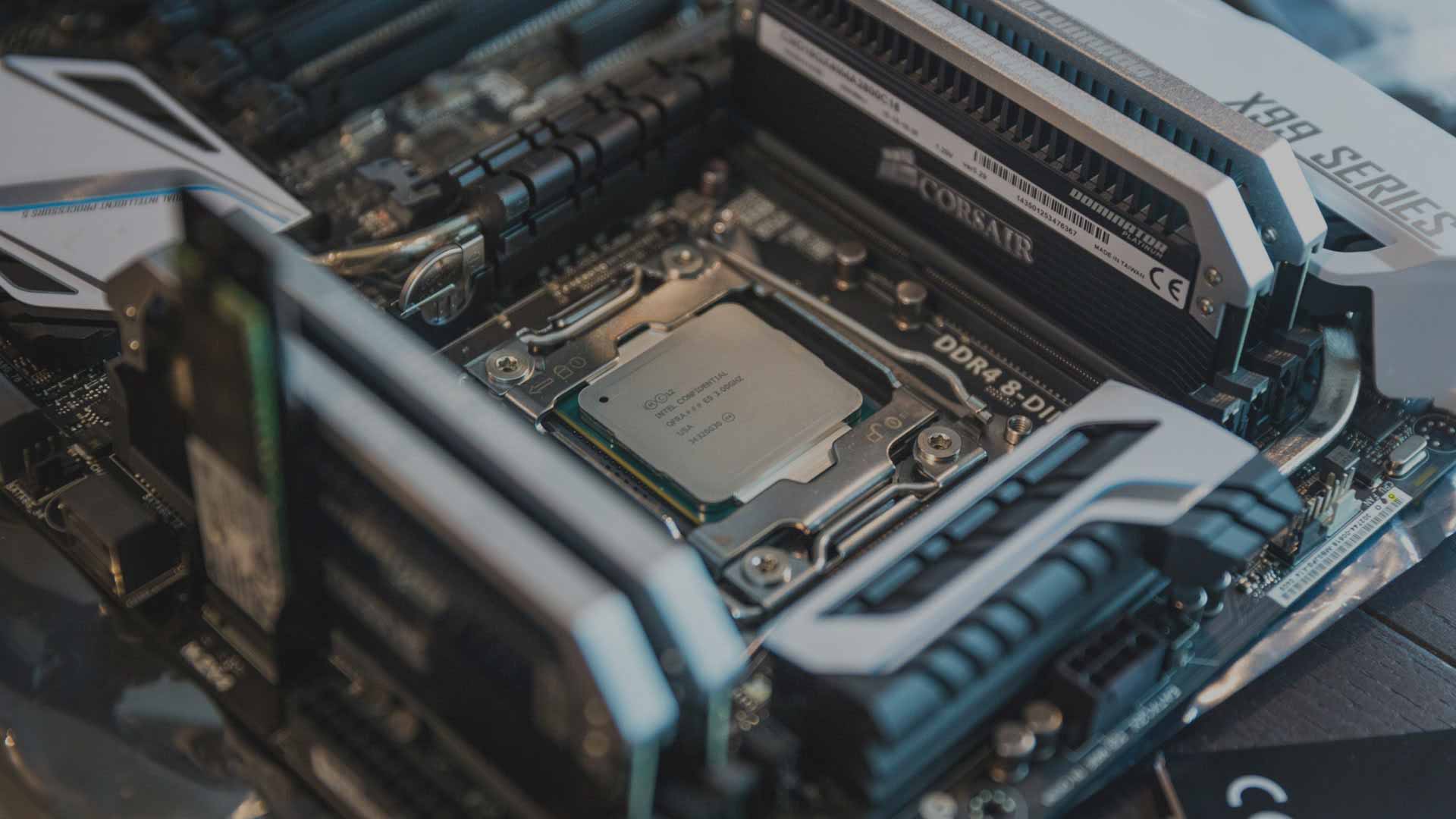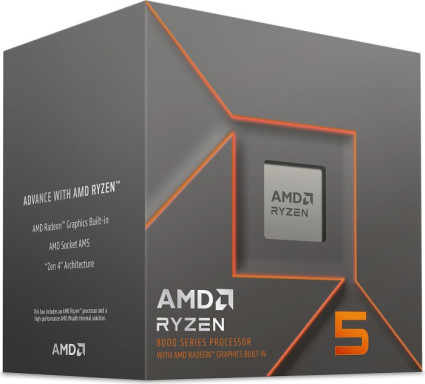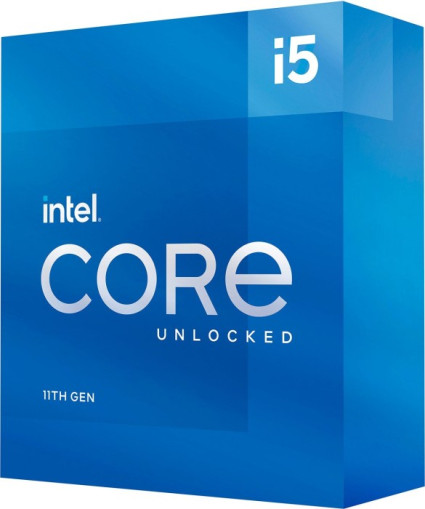
AMD Ryzen 5 8500G vs. Intel Core i5-11600K
In diesem Vergleich von AMD Ryzen 5 8500G versus Intel Core i5-11600K vergleichen wir die technischen Daten der beiden CPUs. Welcher Prozessor ist schneller? Hier gibt es FPS & Benchmarks in Gaming und Anwendungen.

Allgemeine Informationen
| Günstigster Preis |
|
|
| Serie | Ryzen 8000 | Intel Core i-11000 |
| Chip-Architektur | Zen 4 (Persephone) + Zen 4c (Dionysus) | Cypress Cove |
| Codename | Phoenix2 | Rocket Lake-S |
| Produktname | AMD Ryzen 5 8500G | Intel Core i5-11600K |
Spezifikationen
Die Anzahl der Rechenkerne, die maximale Taktrate und die Größe des Cache können sich auf die Leistung in Spielen und Anwendungen auswirken. Mit 6 Kernen bietet der AMD Ryzen 5 8500G gleich viele Kerne wie der Intel Core i5-11600K mit 6 Rechenkernen. Der maximale Takt liegt beim AMD Ryzen 5 8500G mit 5.00 GHz etwas höher als beim Intel Core i5-11600K mit 4.90 GHz. Der Cache ist beim AMD Ryzen 5 8500G mit 6 MB L2-Cache + 16 MB L3-Cache zu 3 MB L2-Cache + 12 MB L3-Cache deutlich höher als beim Intel Core i5-11600K.
| Kerne (Gesamt) | 6 | 6 |
| Anzahl P-Cores | 2C | 6C |
| Anzahl E-Cores | 4c | - |
| Basis-Takt | 3.50 (allgemein) GHz | 3.90 GHz |
| Takt P-Cores | 3.50 (allgemein) GHz | 3.90 GHz |
| Takt E-Cores | 4.10 (Zen 4) GHz | - |
| Turbo-Takt | 5.00 (Zen 4) GHz | 4.90 GHz |
| Turbo P-Cores | 5.00 (Zen 4) GHz | 4.90 GHz |
| Turbo E-Cores | - | - |
| Gesamter L2-Cache | 6 MB | 3 MB |
| Gesamter L3-Cache | 16 MB | 12 MB |
| Fertigung | TSMC 4 nm | Intel 14 nm+++ |
| Rechenleistung | - | - |
| Leistungsaufnahme (TDP) | 65W 45W cTDP-down |
125W 95W cTDP-down (3.60GHz) |
Mainboard-Kompatibilität
Während der AMD Ryzen 5 8500G den AMD AM5 Sockel nutzt, ist der Intel Core i5-11600K mit Mainboards für den Sockel Intel 1200 kompatibel. Die genaue Chipsatz-Eignung und die unterstützten PCIe-Lanes können Sie der Tabelle entnehmen.
| Sockel | AMD AM5 | Intel 1200 |
| Chipsatz-Eignung | A620, B650, B650E, B840, B850, X670, X670E, X870, X870E (modellabhängig: PRO 600, PRO 665, X600) | B560, H470, H510, H570, Q470, W480, W580, Z490, Z590 |
| PCIe-3.0-Lanes | - | - |
| PCIe-4.0-Lanes | 14x (verfügbar: 10) | 20x |
| PCIe-5.0-Lanes | - | - |
RAM-Kompatibilität
Während Sie beim AMD Ryzen 5 8500G bis zu 256 GB vom Typ DDR5 im Dual Channel verbauen können, unterstützt der Intel Core i5-11600K bis zu 128 GB DDR4 Arbeitsspeicher.
| Speicher-Controller | DDR5 | DDR4 |
| Anzahl Speicherkanäle | Dual Channel | Dual Channel |
| max. Speichermenge | 256 GB | 128 GB |
| ECC-Unterstützung | - | - |
Grafik
| iGPU | ✓ | ✓ |
| iGPU-Modell | AMD Radeon 740M | Intel UHD Graphics 750 |
| iGPU-Takt | 2,80GHz | 0,35-1,30GHz |
| iGPU-Einheiten | 4CU/256SP | 2Xe/32EU/256SP |
| iGPU-Rechenleistung | 1.43 TFLOPS (FP32) | 0.67 TFLOPS (FP32) |
| iGPU-Architektur | RDNA 3, Codename "Phoenix2" | Xe-LP / Gen 12.1, Codename "Rocket Lake GT1" |
| iGPU-Interface | DP 2.1, HDMI 2.1 | DP 1.4a (5120x3200@60Hz), eDP 1.4a (5120x3200@60Hz), HDMI 2.0b (4096x2160@60Hz) |
| iGPU-Funktionen | 4x Display Support, AMD Eyefinity, AMD FreeSync 2, AV1 encode/decode, H.265 encode/decode, VP9 decode, DirectX 12.1, OpenGL 4.5, Vulkan 1.0 | 3x Display Support, Intel Clear Video HD, Intel InTru 3D, Intel Quick Sync Video, AV1 decode, H.265 encode/decode, VP9 encode/decode, HDCP 2.3, DirectX 12.1, OpenGL 4.5, OpenCL 3.0, Vulkan 1.0, max. 64GB iGPU-Speicher |
Sonstiges
| Freier Multiplikator | ✓ | ✓ |
| Stepping | PHX2-A0 | B0, Spec Code: SRKNU |
| Heatspreader-Kontaktmittel | - | - |
| Temparatur max. | 95°C (Tjmax) | 100°C (Tjunction) |
| Fernwartung | - | ✓ (Intel vPro) |
| Einführung | 2024/Q1 (8.1.2024) | 2021/Q1 (30.3.2021) |
| Herstellergarantie | 3 Jahre bei AMD® Boxed-Prozessoren (Info EN) | 3 Jahre bei Intel® Boxed-Prozessoren (Info DE/Info EN) |
CPU-Funktionen
| AES-NI | ✓ | ✓ |
| AVX | ✓ | ✓ |
| AVX2 | ✓ | ✓ |
| Boot Guard | - | ✓ |
| CET | - | - |
| DL Boost | - | ✓ |
| EIST | - | ✓ |
| GNA 3.0 | - | - |
| Idle States | - | ✓ |
| Instruction Set | - | ✓ |
| ISM | - | - |
| MBEC | - | - |
| Optane Memory Support | - | ✓ |
| OS Guard | - | ✓ |
| Secure Key | - | ✓ |
| Speed Shift | - | - |
| SSE4.1 | ✓ | ✓ |
| SSE4.2 | ✓ | ✓ |
| Thermal Monitoring | - | ✓ |
| VMD | - | - |
| VT-d | - | ✓ |
| VT-x | - | ✓ |
| VT-x EPT | - | ✓ |
| XD Bit | - | ✓ |
Spiele

- AMD Ryzen 5 8500GAVG100.00 %1%100.00 %
- Intel Core i5-11600KAVG104.25 %1%103.51 %

- Intel Core i5-11600KAVG131.2 FPS1%91.3 FPS
- AMD Ryzen 5 8500GAVG156 FPS1%116 FPS

- Intel Core i5-11600KAVG411.2 FPS1%250.8 FPS
- AMD Ryzen 5 8500GAVG409.4 FPS1%249.8 FPS

- Intel Core i5-11600KAVG128.5 FPS1%77 FPS
- AMD Ryzen 5 8500GAVG122.5 FPS1%72.1 FPS

- Intel Core i5-11600KAVG170.3 FPS1%127.6 FPS
- AMD Ryzen 5 8500GAVG150.5 FPS1%108.7 FPS

- Intel Core i5-11600KAVG121.9 FPS1%76.8 FPS
- AMD Ryzen 5 8500GAVG108.2 FPS1%75.3 FPS

- Intel Core i5-11600KAVG197.5 FPS1%116.9 FPS
- AMD Ryzen 5 8500GAVG180.1 FPS1%115 FPS

- Intel Core i5-11600KAVG65.3 FPS1%45.6 FPS
- AMD Ryzen 5 8500GAVG59.3 FPS1%40.6 FPS

- Intel Core i5-11600KAVG181 FPS1%107.5 FPS
- AMD Ryzen 5 8500GAVG182.9 FPS1%98.8 FPS

- AMD Ryzen 5 8500GAVG1.22 FPSIntel Core i5-11600KAVG0.64 FPS

- AMD Ryzen 5 8500GAVG4.79 FPSIntel Core i5-11600KAVG2.17 FPS
Produktivität
Produktivität

- AMD Ryzen 5 8500GAVG100.00 %Intel Core i5-11600KAVG88.75 %

- AMD Ryzen 5 8500GPKT76723 PunkteIntel Core i5-11600KPKT67155 Punkte

- AMD Ryzen 5 8500GPKT1114 PunkteIntel Core i5-11600KPKT1020 Punkte

- AMD Ryzen 5 8500GPKT638 PunkteIntel Core i5-11600KPKT624 Punkte

- AMD Ryzen 5 8500GSEK409 SekundenIntel Core i5-11600KSEK577 Sekunden

- AMD Ryzen 5 8500GPKT687 PunkteIntel Core i5-11600KPKT584 Punkte

- AMD Ryzen 5 8500GPKT2280 PunkteIntel Core i5-11600KPKT2330 Punkte

- AMD Ryzen 5 8500GPKT11055 PunkteIntel Core i5-11600KPKT9707 Punkte

- AMD Ryzen 5 8500GSEK107 SekundenIntel Core i5-11600KSEK121 Sekunden




